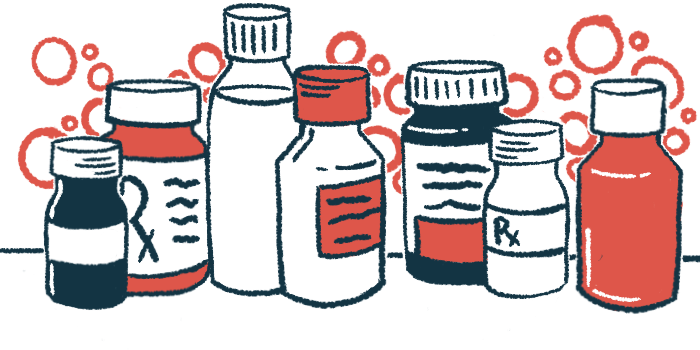#ECTRIMS2022 – Vumerity Lowers RRMS Activity Over 2 Years
Biogen presents findings from the EVOLVE-MS-1 Phase 3 trial
Written by |

Up to two years of Vumerity (diroximel fumarate) treatment was generally well-tolerated and led to significant decreases in disease activity in people with relapsing-remitting multiple sclerosis (RRMS), according to a final analysis of data from the open-label EVOLVE-MS-1 Phase 3 clinical trial.
Indirect comparisons of Vumerity-treated patients against those who received Ponvory (ponesimod) or Aubagio (teriflunomide) in a separate clinical trial also demonstrated that Vumerity outperformed the other treatments at easing signs of disease activity on MRI scans.
The findings were presented by Biogen in two poster presentations at the ongoing 38th Congress of the European Committee for Treatment and Research in Multiple Sclerosis (ECTRIMS) meeting, which ran Oct. 26–28 both virtually and in Amsterdam, the Netherlands.
“Presentations at this year’s ECTRIMS meeting highlight Biogen’s commitment to pursuing research that has a meaningful impact on patients,” Maha Radhakrishnan, MD, Biogen’s chief medical officer, said in a press release.
Marketed by Biogen, Vumerity acts to reduce inflammation and the toxic oxygen molecules that cause damage to nerve cells and contribute to MS progression. Its mechanism of action is similar to that of Biogen’s Tecfidera (dimethyl fumarate), but designed to have fewer gastrointestinal side effects.
Vumerity is currently approved in the U.S. for adults with relapsing forms of MS, and in Europe, for RRMS.
The EVOLVE-MS-1 (NCT02634307) was designed to evaluate the safety, tolerability, and exploratory efficacy of Vumerity among 1,057 adults with RRMS over a 96-week period (nearly two years).
Some participants (464 people) had been involved previously in the EVOLVE-MS-2 Phase 3 trial (NCT03093324), in which participants were assigned randomly to either Vumerity or Tecfidera twice daily for five weeks. The remaining 593 participants were newly enrolled.
In an interim analysis reported last year, Vumerity was deemed well-tolerated and demonstrated promising signs of efficacy, with patients experiencing fewer relapses than before entering the trial, stable or fewer lesions, and with most patients experiencing no progression of disability.
Poster presentation
Barry Singer, MD, director of the MS Center for Innovations in Care at the Missouri Baptist Medical Center, now presented the final results from EVOLVE-MS-1 in a poster titled, “Diroximel fumarate in patients with relapsing-remitting multiple sclerosis: final safety and efficacy results from the phase 3 EVOLVE-MS-1 study.”
Patients had been exposed to Vumerity for a median of 1.8 years, and results showed that safety findings were largely similar to last year’s interim analysis.
Overall, adverse events (side effects) were reported in 88.7% of patients, most of which were mild or moderate in severity. Around 257 patients discontinued treatment during the trial, most commonly due to side effects or patient’s decision.
Gastrointestinal problems were reported in 31.9% of cases, leading to seven treatment discontinuations, while flushing was experienced in 27.2% of patients, leading to five discontinuations.
Exploratory analyses also suggested Vumerity was efficacious in lowering measures of disease activity. Compared with the year prior to study entry, the treatment lowered relapse rates by 81.6%, with 82.4% of patients remaining relapse-free over the two years.
Also, 93.4% of patients were free of confirmed disability progression over the first 48 weeks, and 90.2% remained without progression for the entire two years.
The number of active inflammatory lesions also was reduced significantly with Vumerity, declining by 72.7% in the overall study population. In fact, most patients (91.4%) did not have any inflammatory lesions at week 96. New or enlarging lesions remained stable or declined over the study.
No evidence of disease activity (NEDA-3), defined as an absence of relapses, disability worsening, and new or enlarging lesions, was observed in 65.4% of patients at the 48-week time point, and in 41.1% at 96 weeks.
Importantly, these safety and efficacy trends were similar in a subgroup of 109 patients who had newly diagnosed disease and were treatment-naive at the start of the study.
“These outcomes support [Vumerity] as an effective treatment option in patients with RRMS, including those who are newly diagnosed,” the researchers wrote.
Second poster presentation
In the second poster, “Matching-adjusted indirect comparisons of diroximel fumarate, ponesimod, and teriflunomide for relapsing multiple sclerosis,” Tammy Jiang, PhD, Biogen’s principal statistician, indirectly compared Vumerity against two other approved oral disease-modifying therapies: Ponvory and Aubagio.
Because no clinical trials have compared these three medications directly, the analyses involved data from EVOLVE-MS-1 and the OPTIMUM Phase 3 trial (NCT02425644), which compared Ponvory against Aubagio in 1,133 patients with RRMS or active secondary progressive MS.
Participants from EVOLVE-MS-1 were closely matched to those from OPTIMUM based on age, disability levels, white blood cell counts, and disease activity. The researchers then compared relapse rates, disability progression, and radiological signs of disease activity for the three treatment groups.
In a comparison of 267 Vumerity-treated patients and 567 patients who received Ponvory, data showed that certain clinical outcomes, such as relapse rates and confirmed disability progression, were similar between the two treatments.
However, more patients on Vumerity had no signs of inflammatory lesions (91% vs. 80%) or of new or enlarging lesions (77% vs. 42%) on MRI scans after treatment.
In contrast, Vumerity significantly outperformed Aubagio for all clinical and MRI outcomes, except 24-week confirmed disability progression, for which the two treatments had similar efficacy. That analysis involved 315 people on Vumerity and 566 on Aubagio.
“These new data provide patients and healthcare professionals with further insight on the safety and efficacy of Biogen’s robust MS portfolio to help inform treatment decisions throughout the lifelong MS journey,” Radhakrishnan said.
Note: The Multiple Sclerosis News Today team is providing in-depth coverage of the ECTRIMS Forum 2022 Oct. 26–28. Go here to see the latest stories from the conference.






